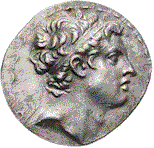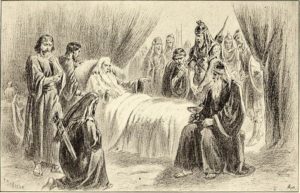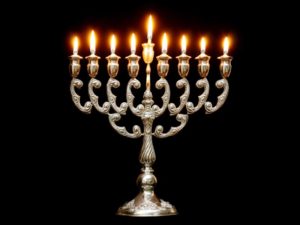The 400 years of “silence” between the closing of the book of Malachi and the birth of Christ is not due to God’s inactivity but rather to no prophet speaking under divine inspiration. The writings during this time, like any other, depict the distinct intervention of God’s hand in the affairs of men. Though not inspired or on par with Scripture, these books called Apocrypha contain important events such as the miraculous story of Hanukkah recorded in 1st and 2nd Maccabees.
 Martin Luther described the Apocrypha as “books which are not regarded as equal to the holy Scriputres, and yet are profitable and good to read.” In the Preface to the Geneva Bible, brought by the Pilgrims to Plymouth, the Apocryphal writings were described as “not received by a common consent to be read and expounded publicly in the Church… to prove any point of Christian religion save in so much as they had the consent of the other scriptures called canonical to confirm the same.” However, “as books proceeding from godly men they were received to be read for the advancement and furtherance of the knowledge of history and for the instruction of godly manners.”
Martin Luther described the Apocrypha as “books which are not regarded as equal to the holy Scriputres, and yet are profitable and good to read.” In the Preface to the Geneva Bible, brought by the Pilgrims to Plymouth, the Apocryphal writings were described as “not received by a common consent to be read and expounded publicly in the Church… to prove any point of Christian religion save in so much as they had the consent of the other scriptures called canonical to confirm the same.” However, “as books proceeding from godly men they were received to be read for the advancement and furtherance of the knowledge of history and for the instruction of godly manners.”
On 25 Kislev (or December 15 on the Roman calendar), in the year 164 BC, an amazing event took place that recounted what was called the feast of dedication or the festival of lights. It is the story of how God miraculously preserved the Jewish people and how they commemorated their deliverance. If there had been no Hanukkah there would have been no Christmas. In other words, if the Jewish people had not been preserved, there would have been no context for the miraculous birth of Jesus the Messiah.
The Jews had returned to their homeland under the Decree of Cyrus, rebuilt the Temple and restored the walls around the city by 400 BC. The first two hundred years (400 to 200) they were devoted to God and fiercely stood against idolatry. But by 200 BC they were smaller in numbers, wealth and fighting men. During the reign of the Greeks Jews learned to speak Greek and the Old Testament was translated into Greek (called the Septuagint). This was God’s intervention to preserve them.
 Antiochus III (198 BC) incurred heavy debts expanding his kingdom. His son Antiochus IV (called Epiphanes to signify his manifestation as “god”) came to the throne in 175, appointing Jason as High Priest in Judea. He was a cruel tyrant (as prophesied by Daniel 11:21-35). In 169 he entered the Sanctuary, took the golden altar, lampstand, utensils and hidden treasures to pay his debts. He plundered the city, burned it with fire and tore down Jewish homes. Anyone who owned a Torah was killed. A remnant, however, still studied the Scriptures secretly at night. When officers would come, they would play a game called dreidle, spinning wooden top while hiding th Torah. It is now used to honor Hanukkah with Hebrew letters meaning “a miracle took place here.” Antiochus minted his image alongside Zeus and proclaimed himself “god”, instituting idolatry and commanding the Jews to break God’s commands. He offered pigs on the altar to mock God’s law and profaned the Sabbath. Women were killed and their circumcised babies mutilated. Some chose to die as martyrs and others fled.
Antiochus III (198 BC) incurred heavy debts expanding his kingdom. His son Antiochus IV (called Epiphanes to signify his manifestation as “god”) came to the throne in 175, appointing Jason as High Priest in Judea. He was a cruel tyrant (as prophesied by Daniel 11:21-35). In 169 he entered the Sanctuary, took the golden altar, lampstand, utensils and hidden treasures to pay his debts. He plundered the city, burned it with fire and tore down Jewish homes. Anyone who owned a Torah was killed. A remnant, however, still studied the Scriptures secretly at night. When officers would come, they would play a game called dreidle, spinning wooden top while hiding th Torah. It is now used to honor Hanukkah with Hebrew letters meaning “a miracle took place here.” Antiochus minted his image alongside Zeus and proclaimed himself “god”, instituting idolatry and commanding the Jews to break God’s commands. He offered pigs on the altar to mock God’s law and profaned the Sabbath. Women were killed and their circumcised babies mutilated. Some chose to die as martyrs and others fled.
 Mattathias, the high priest; 145 years old, was a faithful servant, with five grown sons who were pious and valiant. He lamented, “Alas! Why was I born to see this, the ruin of my people, the ruin of the holy city, and to dwell there when it was given over to the enemy?” When the officers attempted to bribe him to defect, he said, “Even if all the nations that live under the rule of the king obey him, and have chosen to do his commandments, departing each one from the religion of his fathers, yet I and my sons and my brothers will live by the covenant of our fathers…. We will not obey the king’s words by turning aside.”
Mattathias, the high priest; 145 years old, was a faithful servant, with five grown sons who were pious and valiant. He lamented, “Alas! Why was I born to see this, the ruin of my people, the ruin of the holy city, and to dwell there when it was given over to the enemy?” When the officers attempted to bribe him to defect, he said, “Even if all the nations that live under the rule of the king obey him, and have chosen to do his commandments, departing each one from the religion of his fathers, yet I and my sons and my brothers will live by the covenant of our fathers…. We will not obey the king’s words by turning aside.”
When threatened with force to defile the altar on the Sabbath, he cried out, “Let every one who is zealous for the law and supports the covenant come out with me!” He initially did not want to fight but fled to the mountains. After studying the Scriptures he recognized that self-defense was Biblical and formed an army. One year later, at 146 and on his death bed, he addressed his sons: “Arrogance and reproach have now become strong; it is a time of ruin and furious anger. Now, my children, show zeal for the law, and give your lives for the covenant of our fathers. Remember the deeds of the fathers, which they did in their generations; and receive great honor and an everlasting name.” He put Judas in charge.
Judas overcame incredible odds. At one point he faced a force of 60,000 soldiers with only 5,000 men who were tired with no food. However he said, “It is easy for many to be hemmed in by few, for in the sight of Heaven there is no difference saving by many or by few. It is not on the size of the army that victory in battle depends, but strength comes from Heaven.”  Heaven intervened once again and they won! In addition to praying before battles, after they won they would sing hymns of praise. Judas cleansed the temple, rebuilt the altar, removed idol worship and rededicated it on the 25th of Kislev (December 15), the very day it had initially been desecrated! After cleansing the temple they found they had only enough oil to light one lamp for one day. They began with the shemesh (center candle) and lit the others right to left in honor of the Hebrew language. Allegedly, it miraculously burned for eight days!
Heaven intervened once again and they won! In addition to praying before battles, after they won they would sing hymns of praise. Judas cleansed the temple, rebuilt the altar, removed idol worship and rededicated it on the 25th of Kislev (December 15), the very day it had initially been desecrated! After cleansing the temple they found they had only enough oil to light one lamp for one day. They began with the shemesh (center candle) and lit the others right to left in honor of the Hebrew language. Allegedly, it miraculously burned for eight days!
So why should Christians honor Hanukkah? We are to honor our Jewish roots and how God preserved His people (Romans 11:16-18). Though the Maccabees established political independence which lasted until 65 BC when Rome annexed Judea, the Jews had already compromised with Hellenistic thought. Though Herod would declare himself “King of the Jews”, he died in 4 BC, and in “the fullness of time” Jesus would be born in a manger!
 But we should also honor Hanukkah because Jesus did! John 10:22,30,42 says: “Now it was the Feast of Dedication in Jerusalem, and it was winter…. (Jesus said) I and my Father are one…. and many believed in him there.” Jesus was the fulfillment of the Biblical feasts but also at the Feast of Dedication (lights) which He attended He declared that He was sanctified by the Father (John 10:34-36) which means dedicated in Hebrew. Jesus is the cleansed temple, the oil that never runs out and the shemesh that lights each candle! Remember that when you say “Happy Hanukkah” you are rehearsing a miraculous deliverance and preservation of the Jewish people to prepare the world for the coming of Jesus Christ, the light of the world that we might be “blameless and harmless, children of God without fault in the midst of a crooked and perverse generation, among whom we shine as lights in the world.” (Philippians 2:15)
But we should also honor Hanukkah because Jesus did! John 10:22,30,42 says: “Now it was the Feast of Dedication in Jerusalem, and it was winter…. (Jesus said) I and my Father are one…. and many believed in him there.” Jesus was the fulfillment of the Biblical feasts but also at the Feast of Dedication (lights) which He attended He declared that He was sanctified by the Father (John 10:34-36) which means dedicated in Hebrew. Jesus is the cleansed temple, the oil that never runs out and the shemesh that lights each candle! Remember that when you say “Happy Hanukkah” you are rehearsing a miraculous deliverance and preservation of the Jewish people to prepare the world for the coming of Jesus Christ, the light of the world that we might be “blameless and harmless, children of God without fault in the midst of a crooked and perverse generation, among whom we shine as lights in the world.” (Philippians 2:15)







